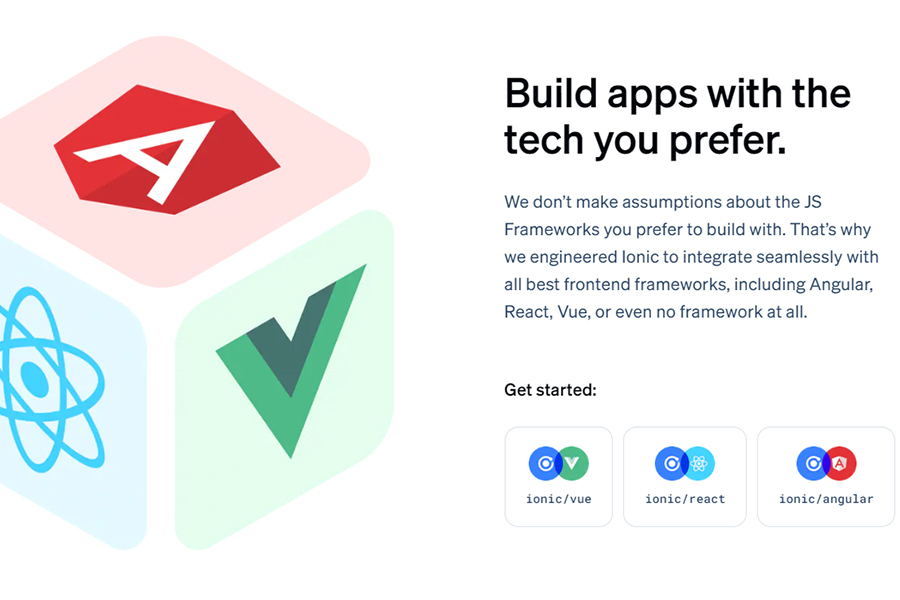Ionic Framework Pros and Cons
Ionic Framework is an HTML5 framework for developing mobile apps across platforms faster and at a better cost compared to native app development. Ionic works on top of Angular, React, or Apache Cordova as a software development toolkit. In this post, we’ll look at the key Ionic Framework pros and cons so you can decide whether this framework is right for your project.
The Pros – Ionic Framework Pros and Cons
- Accessible to Most Developers – Ionic Framework uses established technologies like HTML, CSS, Angular, or Apache Cordova which many developers are familiar with. This enables developers to start building apps with this platform even if they are not familiar with all the ins and out of a specific platform.
- Detailed Documentation – Ionic benefits from good documentation that developers can consult as they embark on their app development project.
- Large Library of Components – From UI components to plugins for integrating app functionalities, Ionic provides plenty of components that save developers time. Instead of writing all the code they need from scratch, they can use these ready-made open-source components.
- Engaged Community – In addition to documentation, Ionic also has a notable community of developers that can answer questions online. Ionic has been around since 2013, during which time it has managed to build an engaged community.
- Good Adaptive Styling – Apps built with this framework will look very familiar to users—in many cases, indistinguishable from natively built apps. Ionic is a reliable choice for projects that need uniform development for all platforms.
- Reliable App Performance – Ionic is one of the fastest cross-platform app frameworks around. It takes advantage of Ahead-of-Time comping, pre-rendering, and hardware-accelerated visual effects.
- Quick Prototyping – With Ionic it’s possible to build an app prototype and test essential app functionality quickly. For projects with a tight deadline, quick prototyping can be very useful.
- Easy App Testing – Developers can test apps build with Ionic using the very web browsers the apps run in, which can help identify and solve issues faster.
The Cons – Ionic Framework Pros and Cons
- Performance Issues for Apps with Heavy Graphics – Ionic Framework uses web browser engines to render graphic elements, which will invariably slow graphics-heavy apps. Ionic was not developed for the cross-platform development of these kinds of apps.
- No Hot Reload – With Ionic, developers can’t apply changes to the code without reloading the app, which increases development time and makes the process less intuitive. For developers used to React’s Hot Reload, the absence of this feature is an important drawback.
- Can’t Integrate Native Plugins – Developers who want to implement a specific feature into an app but don’t find the right plugins for it will have no choice but to code the functionality themselves. Sometimes, this may increase development costs as developers may have to ask for help from an expert in the target platform.
- Technology Mix Increases App Weight – Since Ionic Framework handles programming languages, plugins, and dependencies (in the form of other frameworks), the resulting app size can be notably larger compared to native app development.
Ionic Framework Pros and Cons – Final Thoughts
Ionic Framework enables developers to harness web technologies to build cross-platform apps faster. It’s not the best choice for all types of apps, and it lacks certain features that other frameworks have. Despite these drawbacks, however, Ionic Framework remains a dependable and popular choice with good documentation and community support.
Ionic Framework Additional Resources
- Ionic Framework Official Site – An open source mobile toolkit for building high quality, cross-platform native and web app experiences.
- Ionic Framework Documentation – Start building with Ionic’s cross-platform development kit. Build with your preferred JavaScript Framework, such as React, Angular, or Vue. Start with the CLI or use the Ionic App Wizard
- Ionic’s Community Hub – Join the Ionic Community to share ideas, ask questions and build new connections.
